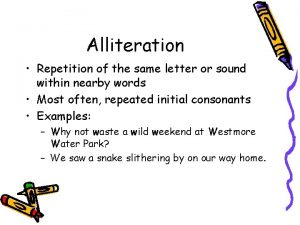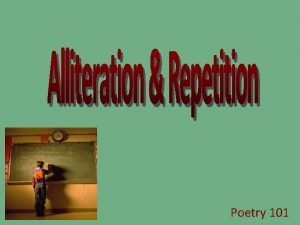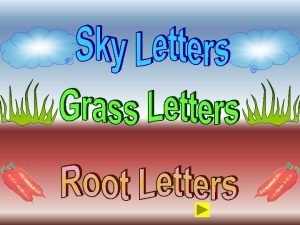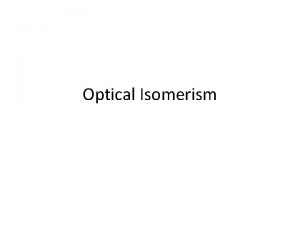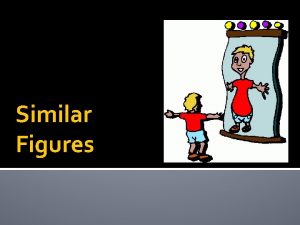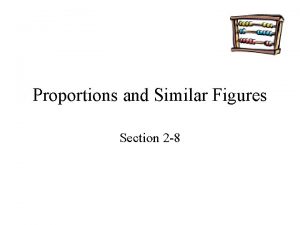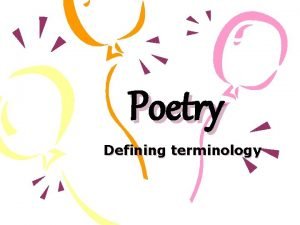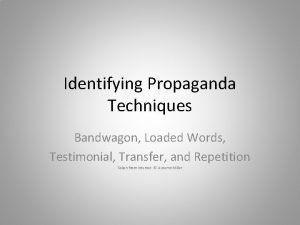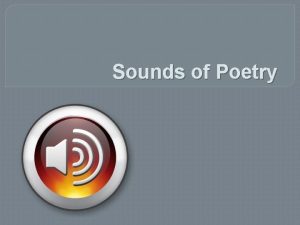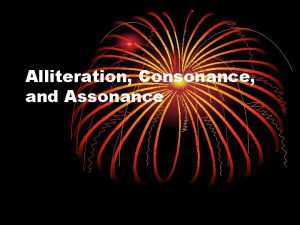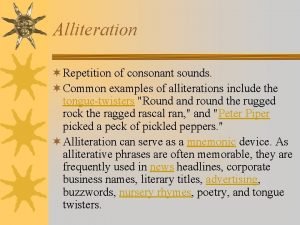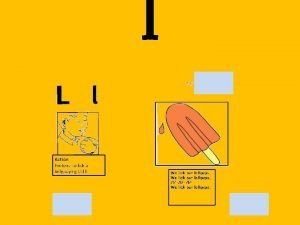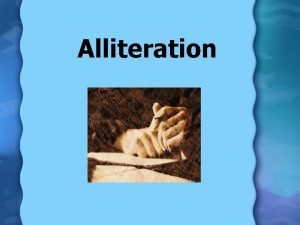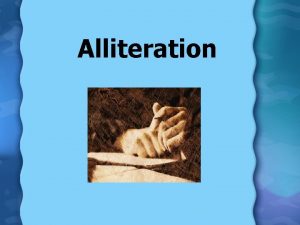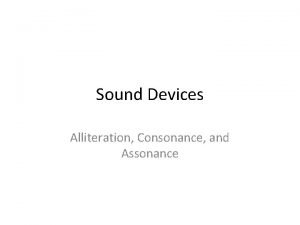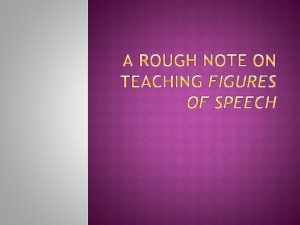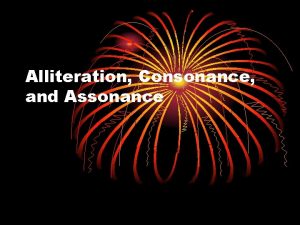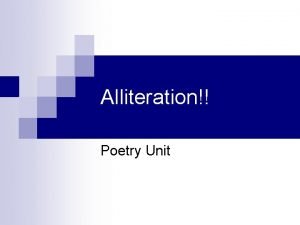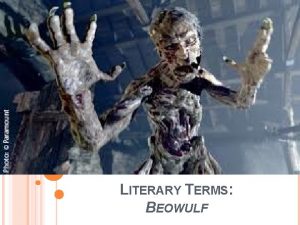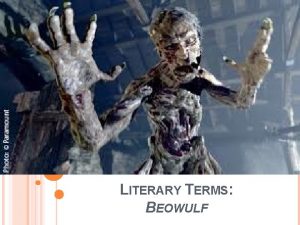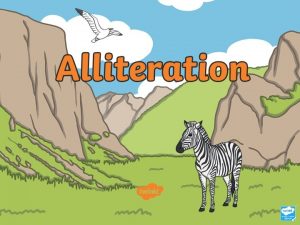Alliteration Repetition of the same letter or sound


















- Slides: 18

Alliteration • Repetition of the same letter or sound within nearby words • Most often, repeated initial consonants • Examples: – Why not waste a wild weekend at Westmore Water Park? – We saw a snake slithering by on our way home.

Allusion • brief reference to a person, event, or place, real or fictitious or to a work of art • Examples: – The student’s procrastination was his Achilles heel. – As we learn, we leave the darkness of the cave for the brightness of newfound knowledge.

Anaphora • Repetition of the same word or group of words at the beginning of successive clauses, sentences, or lines • Examples: – This royal throne of kings, this sceptred isle, This earth of majesty, this seat of Mars, This other Eden, demi-paradise – We must move forward not as a divided people, not as a broken country…

Antimetabole • Repetition of words, in successive clauses, in reverse grammatical order • Examples: – When the going gets tough, the tough get going. – You can take the gorilla out of the jungle, but you can't take the jungle out of the gorilla.

Antithesis • Opposition, or contrast, of ideas or words in a balanced or parallel construction • Example: – Give me liberty or give me death. – We shall support any friend, oppose an foe. – Not that I loved Caesar less, but that I loved Rome more.

Asyndeton and Polysyndeton • Asyndeton: The omission of conjunctions between coordinated phrases, clauses, or words, often resulting in a hurried rhythm or vehement effect • Example: – Caesar: I came; I saw; I conquered. • Polysyndeton: Employing many conjunctions between clauses, often slowing the tempo or rhythm. • Example: – It was dark and there was water standing in the street and no lights and windows broke.

Cumulative Sentence • Sentence that completes the main idea at the beginning of the sentence, and then builds and adds on • Example: – He dipped his hands in the bichloride solution and shook them--a quick shake, fingers down, like the fingers of a pianist above the keys. – I write this at a wide desk in a pine shed as I always do these recent years, in this life I pray will last, while the summer sun closes the sky to Orion and to all the other winter stars over my roof.

Hortative Sentence • sentence that exhorts, advices, calls to action • Less of a command more of a request (imperative sentence is the opposite) • Example: – Let us not wallow in the valley of despair, I say to you today, my friends. – Let us not seek to satisfy our thirst for freedom by drinking from the cup of bitterness and hatred.

Imperative Sentence • sentence used to command, enjoin, implore or entreat • Example: – We must not allow our creative protest to degenerate into physical violence.

Inversion • Inverted order of words in a sentence (variation of the subjectverb-object order) • Examples: – Then up spoke the captain of our gallant ship, And a well-spoken man was he; – Divided there is little we can do.

Juxtaposition • placement of two things closely together to emphasize comparisons or contrasts • Examples: – The darkness of his mood seeped into the lightness I possessed before his appearance.

Metaphor • A comparison made by referring to one thing as another • Examples: – No man island. – For ever since that time you went away I've been a rabbit burrowed in the wood.

Metonymy • Reference to something or someone by naming one of its attributes. • Examples: – The pen is mightier than the sword. *The pen is an attribute of thoughts that are written with a pen; the sword is an attribute of military action – We await word from the crown.

Oxymoron • Placing two ordinarily opposing terms adjacent to one another • Examples: – The sounds of silence filled the room. – But this peaceful revolution.

Parallelism (parallel structure) • Similarity of structure in a pair or series of related words, phrases, or clauses • Examples: – parallelism of words: She tried to make her pastry fluffy, sweet, and delicate. – parallelism of phrases: Singing a song or writing a poem is joyous. – parallelism of clauses: Perch are inexpensive; cod are cheap; trout are abundant; but salmon are best.

Periodic Sentence • A sentence whose main clause is withheld until the end • Example: – For when that greatest of all wars broke out and a multitude of dangers presented themselves at one and the same time, when our enemies regarded themselves as irresistible because of their numbers and our allies thought themselves endowed with a courage which could not be excelled, we outdid them both in a way appropriate to each.

Personification • Reference to abstractions or inanimate objects as though they had human qualities or abilities • Examples: – O beware, my lord, of jealousy! – The insatiable hunger for imagination preys upon human life.

Rhetorical Question • any question asked for a purpose other than to obtain the information the question asks • Examples: – Why are you so smart? – Shall I compare thee to a summer’s day?
 The repetition of the same letter or sound
The repetition of the same letter or sound The repetition of beginning consonant sounds
The repetition of beginning consonant sounds Betty botter bought some butter
Betty botter bought some butter Example of alliteration
Example of alliteration Grass letter root letter
Grass letter root letter Same place same time
Same place same time Trans name
Trans name Same place same passion
Same place same passion Similar figures have the same but not necessarily the same
Similar figures have the same but not necessarily the same Similarity statement
Similarity statement Repetition of similar sounds in two or more words
Repetition of similar sounds in two or more words What is repetition in
What is repetition in Internal alliteration examples
Internal alliteration examples What is the repetition of initial consonant sounds
What is the repetition of initial consonant sounds Conceit literary device
Conceit literary device Consonance vs alliteration
Consonance vs alliteration Repetition of consonantal sounds
Repetition of consonantal sounds Identify alliteration
Identify alliteration Mark the words which the same l sound as in i'll:
Mark the words which the same l sound as in i'll:
